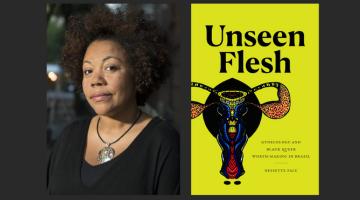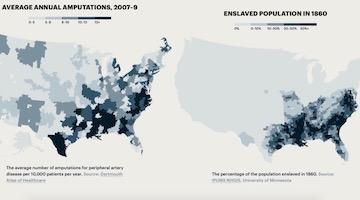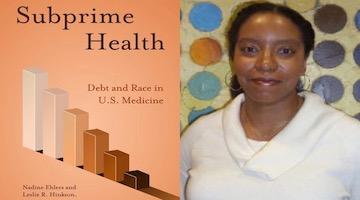In this series, we ask acclaimed authors to answer five questions about their book. This week’s featured author is Psyche A. Williams-Forson. Williams-Forson is Professor and Chair of American Studies at the University of Maryland, College Park. Her book is Eating While Black: Food Shaming and Race in America.
Roberto Sirvent: How can your book help BAR readers understand the current political and social climate?
Psych A. Williams-Forson: In this particular cultural moment when climate change, healthy eating, clean water, lack of food access, and other issues are on people’s minds, Eating While Black: Food Shaming and Race in America enters the conversation to remind Black people that our food and food cultures should not be shamed. How we manage our eating habits—over and underconsumption—are not particular to Black people. Rather, everyone experiences these decisions daily. While these questions are very important, Black people should not believe the ongoing rhetoric that our food cultures alone are unhealthy, are killing us, and/or are not good to or for us. This discourse is rooted in anti-Black racism and is another means by which mass media, nutrition science, economics, and public policy drive entrenched opinions among both Black and non-Black Americans about what is healthful and right to eat. Distorted views of how and what Black people eat are pervasive, bolstering the belief that they must be corrected and regulated. Critical here is whether Americans can learn to embrace nonracist understandings and practices concerning food.
What do you hope activists and community organizers will take away from reading your book?
I hope that activists will understand that usually what is at stake for people is how they sustain culture and heritage through food. Understandably, the buzzwords are important for grantors but the reality is that people eat and we all have intimate relationships to what we consume—love it or hate it—making food and foodways (the processes we engage in to obtain, create, and produce food) very useful. We have to be careful about recognizing how our intent is different from our impact. Just because we as activists and community organizers have a particular goal does not always mean it will land as we intend on those with whom we are working. Being aware of this difference can go far toward helping to open up the path and make it smoother.
We know readers will learn a lot from your book, but what do you hope readers will un-learn? In other words, is there a particular ideology you’re hoping to dismantle?
Great question. One, just because a person’s body is full does not mean they overeat. There are myriad reasons that our bodies are of different sizes. Two, Black women (and men) do exercise. We do not always have the same freedom of movement in this country as non-Black people but that does not mean we want to be fat and/or out of good health. Three, Black people’s bodies and minds do not need to be surveilled. Even if we appear to be unruly in someone else’s mind, we do not need to have the police or other state powers called on us. Fourth, people eat in very different ways. Supermarkets are not the end all to be all and just because they are not in our neighborhoods does not mean we do not and cannot access what is considered healthy foods. Finally, respect people when they tell you what they need to maintain their cultures. Local foods do not always provide the necessary ingredients. So, pushing local foods as the pinnacle is problematic, especially in the wake of the number of immigrant communities in our country.
Who are the intellectual heroes that inspire your work?
Among the many intellectual heroes that I align with are the late 19th and early 20th century Black women who saw the home and domestic arts as a tool of liberation. Moreover, I gain inspiration from the women who ran boardinghouses who are not considered intellectual but did intellectual work that was not documented. I appreciate the work of those women (and men) who see Black liberation as capable of being achieved through tangible aspects in the material world, and their only means of communicating this knowledge was through the WPA ex-enslaved narratives. Lastly, I appreciate the work of Toni Morrison, Alice Walker, Mary Helen Washington, Carla Peterson, Shirley Logan, and countless others who did the work of recovering Black women’s and (men’s) voices through the printed word at a time when few of us knew about the early work of Black intellectual women. I also appreciate much of their work for how it sought to be accessible so that all audiences could see themselves reflected on the page.
In what way does your book help us imagine new worlds?
I wrote this book to probe some of the different ways that we shame people daily—especially with food. I hope that while we are celebrating the uncovering and rediscovery of Black people’s food histories, we will remain open to what we do not know and will enlighten each other on what we find, even when it disagrees with or flies in the face of what we think we know.
Roberto Sirvent is editor of the Black Agenda Report Book Forum.


















